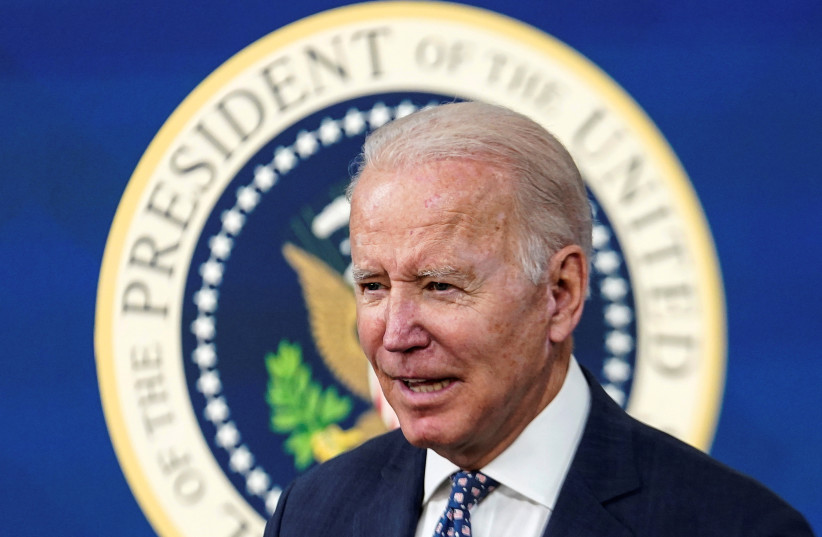Could the COVID-19 pandemic be a factor in the recent terror attacks in Jerusalem and the West Bank?
At first glance, it would seem as if coronavirus and the conflict are two concurrent crises. However, the impact of two years of COVID-19 on all societies – and especially already struggling ones – has been unprecedented. And data is starting to emerge showing the linkage between the virus and violence.
Here are three reasons that coronavirus could be among the catalysts for the recent bout of attacks:
1 - COVID-19 has been linked to an increase in crime
An uptick in crime in all areas of society is being seen two years after the start of COVID-19, according to data.

Israel is on target to see an increase in the annual crime rate this year for the first time in nearly 20 years, according to data shared by the Central Bureau of Statistics.
In the Arab sector specifically, there has been an unprecedented surge in violent crime in the last several years, from 64 homicides among Arabs in 2016 to 67 in 2017, 71 in 2018, 89 in 2019 and 96 in 2020, according to data shared by the Abraham Initiatives.
The organization reported last Thursday that this year it is trending even higher. Already, 117 Arabs have been killed through violent crime, though a spokesperson for the organization said that last year it counted citizens but not non-citizens in east Jerusalem, meaning the numbers are not directly equivalent.
The phenomenon is not only in Israel.
A report by Everytown, a nonprofit fighting for gun safety, showed that the COVID crisis has also had a “pronounced” impact on gun violence in the United States. The report showed that both homicides and unintentional shootings increased to record levels during the first year of the virus.
There were 3,906 additional firearm deaths and 9,278 additional firearm injuries in 2020 compared to 2019, the report said.
“Record increases in gun sales, children homebound like never before, social isolation and economic struggles due to COVID-19 put many people at increased risk from gun violence,” according to Everytown. “In fact, 2020 was one of the deadliest years on record for the United States. Gun homicides and non-suicide-related shootings took approximately 19,300 lives, a 25% increase from 2019” – and the highest rate in the last two decades, the report said.
In general, COVID restrictions negatively impacted people – especially young people.
Putting children into quarantine was correlated with outbursts of anger and expressions of violence, according to a survey of Israeli children by the Social Policy Institute (SPI) at Washington University in St. Louis that was published at the start of the school year.
A majority (59%) of children who had been isolated more than once had outbursts of anger within 30 days of the time that the survey was conducted, compared with fewer than half (43%) of children who had isolated once and just over a third (36%) of those who were never isolated, the survey found.
Moreover, nearly a third (31%) of parents whose children were isolated multiple times said their children had behaved violently toward family members or friends in the past month, compared with 17% and 16%, respectively, among those who were isolated once or were not in isolation.
2 - Poverty and unemployment lower the cost of engaging in violence
COVID-19 also led to an increase in unemployment, poverty and food insecurity.
For Israeli Arabs, coronavirus was “highly detrimental” to their employment situation, a report by the JDC Myers Brookdale Institute showed. At the beginning of the pandemic, nearly 10% more Arabs than Jews applied to the Employment Service for work. That’s because Arabs tend to work in areas that were more severely affected by lockdowns and other restrictions, such as the retail and hotel industries.
Although the World Bank reported last month that the Palestinian economy was showing signs of recovery, it said that sustainable sources of growth remained limited.
“The current consumption-led growth in the West Bank reflects a rebound from a low base in 2020, exacerbated by the COVID-19 crisis,” said Kanthan Shankar, World Bank Country Director for West Bank and Gaza. “The economy… lacks growth drivers for sustained positive impacts on the economy and quality of life. The way ahead is still uncertain and depends on coordinated actions by all parties in revitalizing the economy and providing job opportunities for the young population.”
Studies have shown that unemployment can push people to join violent gangs or drive them to extremism.
In Israel, food insecurity surged with COVID-19, a report published in September by SPI showed. It also found a link between food insecurity and negative behavior in children, including outbursts of anger, expressions of violence and more.
Specifically, more than two-thirds (68%) of food-insecure parents said their children suffered from rage and outbursts compared to 57% of parents who had food security, while almost half (48%) of food-insecure parents said their children had experienced bouts of violence, compared to 31% of food-secure children, the survey found.
In the US the situation was similar, where Everytown found that unemployment resulting from the pandemic contributed to the disproportionate impact of gun violence, specifically on Black communities.
“To contain the virus, thousands of businesses temporarily closed, and many of those closures turned permanent,” the Everytown report explained. “These layoffs disproportionately affected Black communities because they are overrepresented in jobs that cannot be done remotely – jobs that needed to be cut as the pandemic worsened. This kind of economic distress has a significant bearing on all forms of gun violence, as research shows that neighborhoods with high unemployment or high poverty rates have higher rates of gun homicide.”

3 - COVID has kept Biden’s eyes off the Palestinians
When US President Joe Biden was sworn into office in January, Palestinians hoped that he would undo former President Donald Trump’s ironclad pro-Israel policies. But with 49 million Americans diagnosed with coronavirus, including 787,000 who have died from the disease, the president has been forced to focus inward – fighting for vaccine mandates and masking.
Unlike his predecessors, including former President Barack Obama, Biden has not appeared to be too interested in pursuing an Israeli-Palestinian peace agreement since he took office. While Obama appointed George Mitchell as his Mideast envoy within 48 hours of taking office, showing that Palestinian-Israeli peace was among his top priorities, Biden has largely let the process take a backseat to other foreign policy issues, such as US-China relations.
This is partly because top analysts agree that any form of successful negotiations are unlikely in the near term, with neither side willing or able to make the concessions that would be needed to make it work.
As such, Biden seems to have accepted the status quo, even while the more progressive Democrats underneath him have been pushing for him to take a more active role in the region.
Palestinians and their advocates have been left feeling frustrated that the president they hoped would help them is not doing enough to pressure Israel.
So the Palestinians could just be making noise to get the world to turn its attention back to them.
Palestinian violence against Israel existed long before the pandemic, but given the connection between crime and COVID, their symbiotic relationship could re-spark an unfortunate trend.
